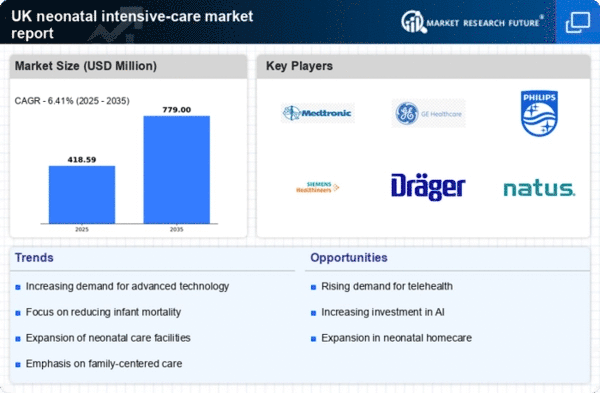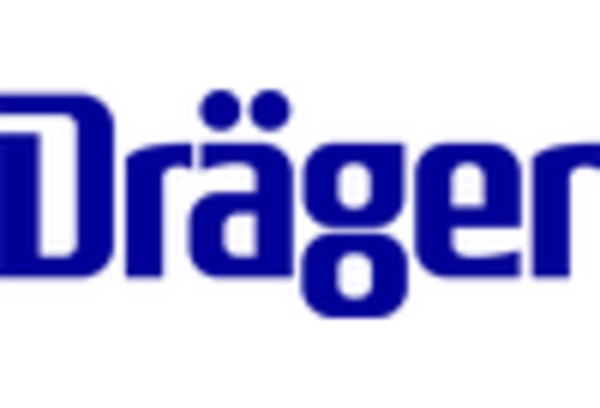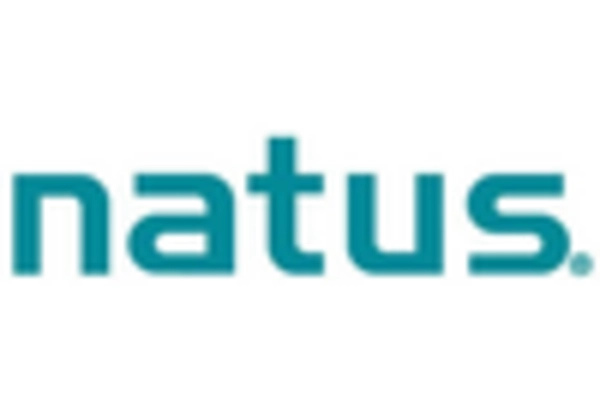Increase in Multiple Births
The rise in multiple births, particularly twins and triplets, is a significant driver of the neonatal intensive-care market. The UK has seen an increase in the number of multiple births, attributed to factors such as advanced reproductive technologies and maternal age. Multiple births often result in higher rates of complications, necessitating specialized neonatal care. This trend is prompting healthcare facilities to enhance their neonatal services and expand capacity to accommodate the needs of these infants. As the incidence of multiple births continues to grow, the neonatal intensive-care market is likely to experience increased demand for specialized care and resources.
Advancements in Medical Technology
Technological innovations are significantly influencing the neonatal intensive-care market. The introduction of advanced monitoring systems, incubators, and respiratory support devices has transformed the landscape of neonatal care. For instance, the integration of telemedicine in neonatal units allows for remote monitoring and consultation, enhancing patient outcomes. The UK healthcare system is increasingly adopting these technologies, which are expected to improve the efficiency and effectiveness of neonatal care. Furthermore, the market for neonatal medical devices is projected to grow at a CAGR of around 8% over the next few years, driven by these advancements. As hospitals invest in state-of-the-art equipment, the neonatal intensive-care market is poised for substantial growth.
Government Initiatives and Funding
Government initiatives play a crucial role in shaping the neonatal intensive-care market. The UK government has implemented various policies aimed at improving maternal and neonatal health outcomes. Funding for neonatal services has increased, with a focus on enhancing infrastructure and training healthcare professionals. Recent reports indicate that the government allocated over £100 million to support neonatal care improvements in the last fiscal year. These initiatives not only aim to reduce infant mortality rates but also enhance the overall quality of care provided in neonatal units. As a result, the neonatal intensive-care market is likely to benefit from sustained government support, fostering an environment conducive to growth.
Growing Awareness of Neonatal Health
There is a growing awareness of neonatal health issues among parents and healthcare providers, which is positively impacting the neonatal intensive-care market. Educational campaigns and community outreach programs have increased knowledge about the importance of early intervention and specialized care for newborns. This heightened awareness is leading to earlier hospital visits and increased demand for neonatal services. Additionally, healthcare professionals are more vigilant in identifying at-risk infants, which further drives the need for intensive care. As public awareness continues to rise, the neonatal intensive-care market is expected to expand, reflecting the changing attitudes towards neonatal health and the importance of specialized care.
Rising Prevalence of Premature Births
The market is experiencing growth due to the increasing prevalence of premature births in the UK. Recent statistics indicate that approximately 1 in 13 babies are born prematurely, leading to a heightened demand for specialized neonatal care. This trend necessitates the expansion of neonatal units and the availability of advanced medical equipment. As healthcare providers strive to improve outcomes for these vulnerable infants, investments in neonatal intensive-care facilities are likely to rise. The UK government has recognized this issue, allocating funds to enhance neonatal services, which further propels the market. The rising number of premature births, coupled with the need for specialized care, suggests a robust growth trajectory for the neonatal intensive-care market in the coming years.

















